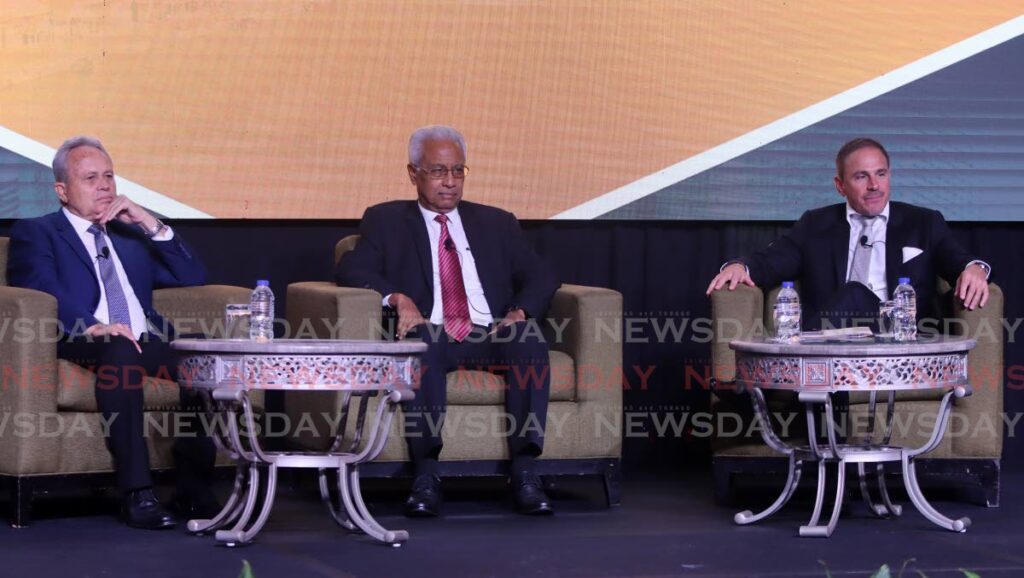Imbert: Government doesn't believe employers, landlords will pass on costs of minimum wage hike, property tax

MINISTER OF FINANCE Colm Imbert, the day after reading the 2024 budget on Monday, said policies such as the increase in the minimum wage and the property tax were implemented to address major issues.
“We are solving the problems,” Imbert said, while fielding questions at the Trinidad and Tobago Manufacturers Association (TTMA) post-budget discussion at the Hyatt Regency in Port of Spain.
“If there are consequential effects, then we can deal with that as we go along.”
Asked about the possibility that businesses could pass on the costs of increasing the minimum wage to $20.50 an hour, Imbert said government looked more at the value it could bring to people working for the minimum wage, rather than the possible effects.
“If you adopt the position that an increase in the minimum wage could lead to increased costs, then you would never raise it,” he said. “The policy has to be, is it a fair wage or not?”
He added that when the ministry looked at increasing the minimum wage it did a study looking at the inflation pass-through in the last wage increase.
“It was minimum,” he said. “Most businesses absorbed the last increase in the minimum wage.”
While he took the position that he could not speak for property owners and landlords, he also anticipated that they would also absorb costs of the property tax rather than pass it on to tenants. He pointed out that because the real-estate market is highly competitive, landlords may again absorb the costs rather than risk losing tenants altogether.
“We looked at the valuation roll, and properties that might have rental values at $10,000, which is at the upper end of the spectrum, and I saw that the tax might be $200-$250 a month.
“I thought to myself, if you are generating $10,000 a month, and you have to pay a tax of $200 a month…you are in a competitive system. So do you add $200 to your rent and you become non-competitive and you have no revenue, or you absorb that and you keep your tenants?
“It’s all about competition and a competitive environment, so I don’t think there would be any immediate pass-through. If people just jack up rents, they will lose their tenants. That’s my take on it.”
Similar to the minimum wage increase, Imbert said the property tax addresses the problem of non-productive municipal corporations, which are at the centre of several local government complaints.
“We are giving the municipal corporations additional funds, because it became a problem. We all have a problem. We are not satisfied with the developing infrastructure; we are not satisfied with something as mundane as garbage collection.
“So if it has a consequence, then it’s all about balance. Do you continue a situation where local government corporations are unproductive and the roads are not paved and the watercourses are not cleaned and the garbage is not cleared and the recreation grounds are not cut? Is that what you want?
"Obviously not, so we are solving the problem.”
TT Fair Trade Commission chairman Dr Ronald Ramkissoon said for some small businesses, the increase in minimum wage will have an impact, but because markets in TT are competitive, the competition in the market will dictate whether costs are passed on. He added that businesses should, beyond paying the minimum wage, seek to give their employees payment that would allow them to afford a decent living.
“We should really have as a goal the attempt to lift everyone away from the minimum wage,” he said. “We want to produce goods and services that employ as many people as possible at much higher (rates).
“If (businesses) find that the cost of labour is too high, then it is natural to do the other thing, which is to become more capital-intensive, and to use machinery and different systems so they would not have to employ as much labour. With the training that the minister has mentioned – that apprenticeship training I think is important, and it is going to take workers to a higher level and to higher payment.”
TTMA President Ronald Roach said the association had no objections to the increase in the minimum wage, partly because businesses in the association are already paying staff at a similar rate.
“There is minimum wage and there is living wage,” Roach said. “We in the business community have to be cognisant of the issues that employees are facing, and we have to make those adjustments accordingly.”


Comments
"Imbert: Government doesn’t believe employers, landlords will pass on costs of minimum wage hike, property tax"